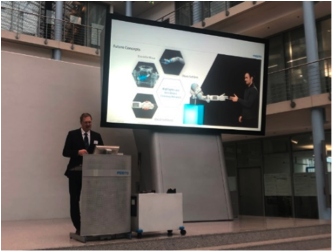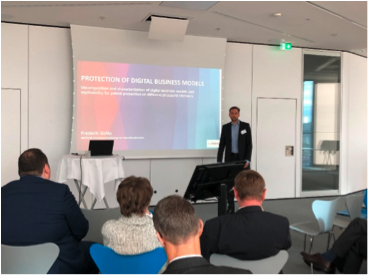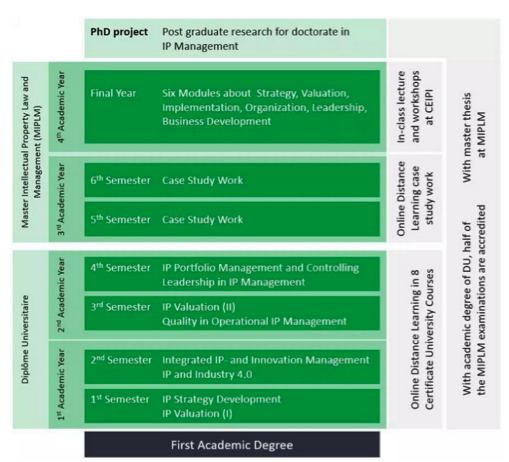The challenge of digital business models and their protection: Colloquium on digital patents at FESTO
The Digital Patents Excellence Groups faced critical questions from mentors from industry on May 8th and 9th, 2019 in a colloquium at the Graduate School. With over 50 participants, there was great interest in discussing the research results on the protection of digital business models, the use of digital patents in various industries and the protection of business solutions based on artificial intelligence technologies.
On the evening of May 8th, the event began in the Technology Center in Esslingen under the patronage of the CEO of Festo AG & Co. KG, Dr. h.c. Oliver Jung, Dean of the Diesel Board of Trustees.
The mentoring program of the Graduate School of the Diesel Medal serves as an exchange between doctoral students and mentors and invited guests from the industry. The mentoring program ensures that the projects and activities of the Graduate School are embedded in operational practice. In this way, the technical anchoring of the researched question at the Graduate College of the Diesel Medal is achieved in industrial reality.
In his opening lecture, Dr. Jung, how important the innovation culture is to him for Festo. Every year, the automation experts invest around eight percent of sales in research and development for innovative solutions that give customers clear competitive advantages. The result is over 100 new products that are ready for patents annually and more than 2,600 patents worldwide, as well as being awarded the German Future Prize 2010.

Above all, the change in production is viewed holistically at Festo from different perspectives. In addition to the technology itself, the interaction between people and technology as well as the subject of training and qualification is analyzed and designed. The real and virtual world are growing closer together, modern information and communication technologies are merging with industrial processes and are thus increasingly changing the production landscape. Industry 4.0 summarizes a wide range of activities under one term and thus describes the change that is placing new demands on production systems, machines and people in many areas.
Dr. Heinrich Frontzeck then presented Festo’s Bionic Learning Network. In everyday factory life, automation technology takes on typical tasks such as gripping, moving and positioning goods as well as controlling and regulating processes. Nature solves all these tasks naturally, simply and energy-efficiently. What could be more natural than to look at their phenomena and learn from them? That is why Festo has set up a research association with well-known universities and institutes, development companies and private inventors: the Bionic Learning Network.
 On May 9th, the mentors, guests and doctoral students met on the top floor of the Festo automation center in Esslingen to discuss the future of IP in the digital transformation of industry with a spectacular view over the Neckar valley.
On May 9th, the mentors, guests and doctoral students met on the top floor of the Festo automation center in Esslingen to discuss the future of IP in the digital transformation of industry with a spectacular view over the Neckar valley.
The doctoral students of the Digital Patent Excellence Group work together on various issues relating to the protection of digital business models in B-to-B and B-to-C markets and industries. The issues in the research area of IP management at the Graduate College of the Diesel Board of Trustees are characterized by complexities and implications that cannot be adequately represented scientifically in individual doctoral projects. The aim of groups of excellence is to work on the research topics as comprehensively as possible and precisely in their practice-relevant complexity. For this purpose, groups of doctoral students work together under one umbrella topic on the various facets, in order to avoid excessive isolation of the questions and to achieve overarching results from different perspectives through mutual exchange. Professional interaction and pooling of resources enable excellent results in an international comparison and is the basis for progress in knowledge, competence and practical implementation in business.
Protection of Digital Business Models, Dr. Frederic Golks, LL.M., Robert Bosch GmbH

Under the heading “Protection of Digital Business Models”, Dr. Frederik Golks, LL.M. from Robert Bosch GmbH in Stuttgart, his work. Dr. Golks is a graduate of the Master Class for IP Law and Management (MIPLM) at CEIPI and holds a PhD in Physics. In addition to his doctorate at CEIPI on IP management on the protection of digital business models, he works at Bosch on operational and strategic IP issues as Senior IP Counsel. His work mainly deals with the decomposition and characterization of digital business models and the applicability of patent protection to the various structural components. It is important to understand which interaction the individual structural components have in digital business models and to what extent these can be viewed separately. The basic assumption is that such structural components have recurring patterns and are used recombinantly in different business models. If this can be proven, and this is already referred to by other authors such as Prof. Oliver Gassmann, Professor of Technology Management from the Institute of Technology Management at the University of St. Gallen in his St. Gallen Business Model Navigator and the associated scientific work, results in an interesting range of applications for the targeted development of patent strategies. In the model by Dr. Golks, the structural components are differentiated on the one hand according to various technological levels such as the application layer, so-called core technologies, enabling technologies and traditional technologies.
In addition, Dr. Golks the Industry 4.0 layer model from Fleisch (2005) et al. “Business Models and the Internet of Things” detailed in the Bosch Whitepaper Fleisch, E .; Weinberger, M .; Wortmann, F .: “Business Models and the Internet of Things”, Bosch Internet of Things & Services Lab.
Characterization of digital patents, Moritz Breitenbach, LL.M., B. Braun Melsungen AG
Moritz Breitenbach’s work deals with the more detailed characterization of digital patents. Mr. Breitenbach completed organic chemistry and chemical biology at ETH Zurich and UC Berkeley with a bachelor’s degree in “interdisciplinary natural sciences” and received his master’s degree from Stanford University. After consulting on technology and strategy at Accenture, he trained as a patent attorney and has been a patent counsel at B. Braun Melsungen since 2016. In 2017 he was admitted as a representative before the European Patent Office and in 2018 his LL.M. completed in MIPLM at CEIPI.
The basic assumption of Moritz Breitenbach’s work is the use of digital patents to protect digital business models from imitation. In particular, digital patents protect the value-adding steps of digital business models. The exclusive position in market application or in competition arises from the prohibition against third parties. Analogous to DIN77100 “Principles of proper patent valuation”, this creates the economic value of the respective digital patent. Using the example of agriculture, Mr. Breitenbach, how value generation mechanisms for users are protected by digital patents through the emerging digital platforms, for example 365 FarmNet from CLAAS.
Patent strategies to protect AI-based technologies, Dr. Martin Wilming, Hepp Wenger Ryffel AG
Dr. Martin Wilming studied chemistry at the Ruhr University Bochum and received his doctorate in bio-organic chemistry. In 2007 he received his LL.M. completed in MIPLM at CEIPI. He works as a Swiss and European patent attorney in the law firm Hepp Wenger Ryffel AG in Wil. He is a board member of the MIPLM’s alumni organization: I3PM – International Institute for IP Management.
Artificial intelligence defines Dr. Wilming on the basis of the work of Shannon et al .: “The study is to proceed on the basis of the conjecture that every aspect of learning of any other feature of intelligence can in principle be so precisely described that a machine can be made to simulate it ”, McCarthy, J.; Minsky, M.L.; Rochester, N.; Shannon, C.E.A., Proposal for the Dartmouth Summer Research Project on Artificial Intelligence, 1955. Artificial intelligence is increasingly perceived as a key technology and can be used specifically in industrial practice via various software products from Google or Microsoft. Dr. In his work, Wilming deals with observable international patent activities and the patent strategies behind them. He analyzes the registration and granting practice as well as the fundamental difficulties of classifying AI-based technologies as a branch of computer science, which are based on algorithms, which in turn are executed on known hardware, in the patent system. He distinguishes between two topics. On the one hand, artificial intelligence as such, i.e. computational models and algorithms for classification, bundling, regression and dimensionality reduction, such as neural networks, genetic algorithms, support vector machines, et cetera; on the other hand, the results achieved through the use of artificial intelligence, such as optimized surface topographies, component geometries or new types of pharmacological agents. At the core of his analysis is the question of what is “not obvious” in the mind of the expert in the age of AI and for whom?
Digitization – Challenge for Invention Management, Kerstin Single, Festo AG & Co. KG
Ms. Kerstin Single heads the IP management at Festo. She specializes in employee invention law, IP management and the further development of internal information and administrative processes. Ms. Single is a mechanical engineer and has been with Festo since 2007.
In her presentation on IP management at Festo, she shows the enormous challenges of digitization for a medium-sized company. To show presence from the IP department in the innovation creation process in particular and to actively participate in the development processes is know-how and resource-intensive. Due to the digital transformation, the already high complexity of patent work is increasing and the particular challenge lies in orienting patents to digital business models and not to the technical details of products.
Keep It Sparkling – IP management at Swarovski, Leo Longauer, VP Corporate IP, D. Swarovski KG
Leo Longauer is a graduate of the MIPLM at the CEIPI. He is Vice President Intellectual Property | Corporate Legal at Swarovski. Before joining Swarovski, he was in charge of the IP department at UBS and a trademark examination department at the Swiss Federal Institute for Intellectual Property in Bern.
Swarovski is a manufacturer of crystal glass from Austria. The special ability to grind the material has characterized the company since it was founded in 1895. Swarovski is one of the leading brands in the field of jewelry and accessories worldwide. In the Swarovski brand, fashionable design merges with global branding. The continuous further development of materials and techniques make Swarovski a leading manufacturer and market representative for sparkling crystal creations.
The Swarovski brand management is considered exemplary. In his book “Sensory Branding”, Paul Steiner selected Swarovski as a case study. For example, the internationally renowned Austrian artist André Heller is responsible for the unique brand platform Kristallwelten in the Tyrolean region of Hall-Wattens. The Kristallwelten adventure park, which is ten football fields, includes areas known as Chambers of Wonder, created, designed and inspired by artists such as Brian Eno, Keith Haring, Andy Warhol and Niki de Saint Phalle.
The Swarovski Group generates sales of 3.5 billion euros with over 34,000 employees and is divided into three strategic business units: Swarovski Optik, Tyrolit and Swarovski Crystal Business with production sites in Austria, Thailand, Serbia, India, Vietnam and the USA. At Swarovski, IP management is part of the corporate strategy.
The IP management has different focuses:
- The brand with the aspects of clearance / risk management, the fair use / co-branding strategy, protection, defense and counterfeiting
- The patents with the aspects of recording and protecting inventions, processes and decisions, collaborations and the creation of assets
- The design and copyrights with the aspects of clearance / risk management, protection processes, defense and the look a like topics
- The organization of the team, outsourcing issues and the tools used
- Reporting, positioning and training to and with internal customers
- The cooperation with outside counsels, their selection, budgeting and controlling
Eisenführ Speiser Academy in cooperation with CEIPI, Dr. Julian Eberhardt, LL.M, Eisenführ Speiser
Eisenführ Speiser Patentanwälte Rechtsanwälte PartGmbB is one of the leading German IP law firms with offices in Bremen, Munich, Berlin and Hamburg. The firm has more than 50 years of experience in obtaining, defending and enforcing patents, trademarks and designs. With more than 250 employees, including more than 45 patent attorneys and attorneys, you are in national and international work.
Eisenführ Speiser has established its own academy as a corporate university for its associates with the Graduate College of the Diesel Medal. The academic training partner is the Center for International Intellectual Property Studies (CEIPI).  The training in IP management is part-time for four years and corresponds to a teaching intensity of around 1.5 hours per week per semester. Eisenführ Speiser is convinced that knowledge of patent and IP law alone does not make a valuable advisor for clients from the industry. In the increasingly complex fields of action of companies, it is important for patent attorneys and lawyers to also understand the economic and management-oriented background of legal issues. In addition, there are important areas of law in which an economic understanding is essential for an appropriate treatment of the issues, such as competition law, antitrust law, the drafting of license agreements or transfer price issues for intangible assets.
The training in IP management is part-time for four years and corresponds to a teaching intensity of around 1.5 hours per week per semester. Eisenführ Speiser is convinced that knowledge of patent and IP law alone does not make a valuable advisor for clients from the industry. In the increasingly complex fields of action of companies, it is important for patent attorneys and lawyers to also understand the economic and management-oriented background of legal issues. In addition, there are important areas of law in which an economic understanding is essential for an appropriate treatment of the issues, such as competition law, antitrust law, the drafting of license agreements or transfer price issues for intangible assets.
With the Corporate University for its own associates, Eisenführ Speiser presents itself as an attractive, know-how and career-oriented employer brand. By working with the most successful academic IP management training program in Europe, the economic competence of our own lawyers is strengthened and the relationship with clients is intensified. The training lasts eight semesters. In the first two years, a Diplôme Universitaire is obtained through distance learning. In these four semesters, the participants complete a total of eight courses, each with a university certificate. This is followed by the master’s program with one year of case study and a final year with face-to-face training in Strasbourg at the CEIPI. The Eisenführ Speiser Academy starts in September 2019.
Quality initiative for IP management – QIMIP, Dr. Lorenz Kaiser, Dr. Hanns-Peter Tümmler, German Institute for Invention
QIMIP is a department of the German Institute for Invention and supports the German industry in the implementation of DIN77006 “Guidelines for Quality in IP Management”. QIMIP was presented to the specialist public at a special reception by the German Institute for Invention in December 2017 and was initiated by Prof. Norbert Haugg, a.D. President of the German Patent and Trademark Office a.D. and honorary chairman of the German Institute for Invention. Dr. Hanns-Peter Tümmler is the chairman of the board and Dr. Lorenz Kaiser Secretary General of QIMIP. The initiative is one of the specific demands of the Industry Council for Competition Issues at the Diesel Board of Trustees, which dealt with the digital transformation of industry and the associated problems for IP management as part of the position paper “IP as a competitive instrument in Industry 4.0”.
As discussed at the meeting on November 29, 2017 in the BDI’s Committee for Commercial Legal Protection, the challenges posed by digitization and the further increase in complexity in IP management are associated with considerable risks for industry [EPA study]. In various industry hearings, the problems of freedom to exercise digital business models, the increase in the number of digital patent applications, in particular the technological developments and the enormous number of patent applications from China and, last but not least, the patent activities of chinese companies in high-tech areas in Europe were discussed in detail and the need for both Support, as well as according to a normative framework. These developments are particularly problematic for small and medium-sized companies, as there are hardly any resources, experience and skills available to deal with the increasingly complex digital competitive situations in the patent area. The latest attack on VW with a billions in claims and the threat of a production stop for the Golf, Passat, Touran, Tiguan and models from Porsche and Audi shows how dramatic the issue of digital patents can be for industry and how important quality management in IP management is is also due to the increasing number of standard essential patents in the mobile radio standard of the Internet of Things. The increasing number of patent infringement lawsuits in cloud computing should also alert the top management of companies in particular, as central company processes can be affected by injunctive relief and thus company closures. KPMG is already training startups on how to use DIN77006 as part of the “Smart Start” initiative. Auditor Prof. Dr. Christian Zwirner, Head of Unit for Evaluation and Auditing, in his article on the publication of the draft version of DIN77006 (Der Betrieb, p. 1686, DB1274268, Issue 29, July 20, 2018) rightly emphasizes the special importance of IP compliance and the related issues of management liability risks. The importance of DIN77006 for corporate financing and how banks pay attention to IP compliance and react to IP risks from digitization was discussed intensively last autumn at the largest German SME financier, Landesbank Baden-Württemberg.



